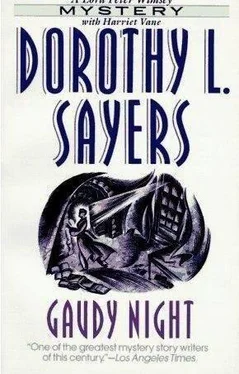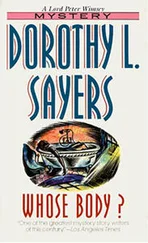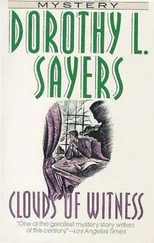Dorothy Sayers - Gaudy Night
Здесь есть возможность читать онлайн «Dorothy Sayers - Gaudy Night» весь текст электронной книги совершенно бесплатно (целиком полную версию без сокращений). В некоторых случаях можно слушать аудио, скачать через торрент в формате fb2 и присутствует краткое содержание. Жанр: Детектив, на английском языке. Описание произведения, (предисловие) а так же отзывы посетителей доступны на портале библиотеки ЛибКат.
- Название:Gaudy Night
- Автор:
- Жанр:
- Год:неизвестен
- ISBN:нет данных
- Рейтинг книги:4 / 5. Голосов: 2
-
Избранное:Добавить в избранное
- Отзывы:
-
Ваша оценка:
- 80
- 1
- 2
- 3
- 4
- 5
Gaudy Night: краткое содержание, описание и аннотация
Предлагаем к чтению аннотацию, описание, краткое содержание или предисловие (зависит от того, что написал сам автор книги «Gaudy Night»). Если вы не нашли необходимую информацию о книге — напишите в комментариях, мы постараемся отыскать её.
Gaudy Night — читать онлайн бесплатно полную книгу (весь текст) целиком
Ниже представлен текст книги, разбитый по страницам. Система сохранения места последней прочитанной страницы, позволяет с удобством читать онлайн бесплатно книгу «Gaudy Night», без необходимости каждый раз заново искать на чём Вы остановились. Поставьте закладку, и сможете в любой момент перейти на страницу, на которой закончили чтение.
Интервал:
Закладка:
“I thought the noise in Hall was more like a cage full of peacocks.”
“Yes; but out of Hall you can pick out the people who speak the right way. Lots of them don’t, of course; but some do. You do; and you have a lovely voice into the bargain. Do you remember the old Bach Choir days?”
“Do I not. Do you manage to get any music on the Welsh border? The Welsh can sing.”
“I haven’t much time for music. I try to teach the children.”
Harriet took advantage of this opening to make suitable domestic inquiries. She parted eventually from Mrs. Bendick with a depressed feeling that she had seen a Derby winner making shift with a coal-cart.
Sunday lunch in Hall was a casual affair. Many people did not attend it, having engagements in the town. Those who did, dropped in as and when they liked, fetched their food from the serving-hatches and consumed it in chattering groups wherever they could find seats. Harriet, having seized a plate of cold ham for herself, looked round for a lunch partner, and was thankful to see Phoebe Tucker just come in and being helped by the attendant scout to a portion of cold roast beef. The two joined forces, and sat down at the far end of a long table which ran parallel to the High and at right angles to the other tables. From there they commanded the whole room, including the High Table itself and the row of serving-hatches. As her eye wandered from one briskly occupied luncher to the next, Harriet kept on asking herself, Which? Which of all these normal and cheerful-looking women had dropped that unpleasant paper in the quad the night before? Because you never knew; and the trouble of not knowing was that you dimly suspected everybody. Haunts of ancient peace were all very well, but very odd things could crawl and creep beneath lichen-covered stones. The Warden in her great carved chair was bending her stately head and smiling at some jest of the Dean’s. Miss Lydgate was attending, with eager courtesy, to the wants of a very old student indeed, who was almost blind. She had helped her stumbling feet up the three steps of the dais, fetched her lunch from the hatch and was now putting salad on her plate for her. Miss Stevens the Bursar and Miss Shaw the Modern Language Tutor had collected about them three other old students of considerable age and attainments; their conversation was animated and apparently amusing. Miss Pyke, the Classical Tutor, was deep in a discussion with a tall, robust woman whom Phoebe Tucker had recognized and pointed out to Harriet as an eminent archaeologist, and in a momentary flash of comparative silence, the Tutor’s high voice rang out unexpectedly: “The cumulus at Halos appears to be an isolated instance. The cist-graves of Theotokou…” Then the clamour again closed over the argument. Two other dons whom Harriet did not recognize (they were new since her day) appeared from their gestures to be discussing millinery. Miss Hillyard, whose sarcastic tongue tended to isolate her from her colleagues, was slowly eating tier lunch and glancing at a pamphlet she had brought in with her. Miss de Vine, arriving late, sat down beside Miss Hillyard and began to consume ham in a detached way with her eyes fixed on vacancy.
Then the Old Students in the body of the Hall-all types, all ages, all varieties of costume. Was it the curious round-shouldered woman in a yellow djibbah and sandals, with her hair coiled in two snail-shells over her ears? Or the sturdy, curly-headed person in tweeds, with a masculine-looking waistcoat and the face like the back of a cab? Or the tightly-corseted peroxide of sixty, whose hat would better have suited an eighteen-year-old debutante at Ascot? Or one of the innumerable women with “school-teacher” stamped on their resolutely cheery countenances? Or the plain person of indeterminate age who sat at the head other table with the air of a chairman of committee? Or that curious little creature dressed in unbecoming pink, who looked as though she had been carelessly packed away in a drawer all winter and put into circulation again without being ironed? Or that handsome, well-preserved business woman of fifty with the well-manicured hands, who broke into the conversation of total strangers to inform them that she had just opened a new hairdressing establishment “just off Bond Street ”? Or that tall, haggard, tragedy-queen in black silk marocain who looked like Hamlet’s aunt, but was actually Aunt Beatrice who ran the Household Column in the Daily Mercury? Or the bony woman with the long horse face who had devoted herself to Settlement work? Or even that unconquerably merry and bright little dumpling of a creature who was the highly-valued secretary of a political secretary and had secretaries under her? The faces came and went, as though in a dream, all animated, all inscrutable.
Relegated to a remote table at the lower end of the Hall were half-a-dozen present students, still lingering in Oxford for viva voce examinations. They babbled continually among themselves, rather obviously ignoring the invasion of their college by all these quaint old freaks who were what they themselves would be in ten years’ time, or twenty or thirty. They were a badly-turned-out bunch, Harriet thought, with an end-of-term crumpled appearance. There was an odd, shy-faced, sandy girl with pale eyes and restless fingers, and next to her a dark, beautiful one, for whose face men might have sacked cities, if it had had any sort of animation; and there was a gawky and unfinished-looking young person, very badly made up, who had a pathetic air of seeking to win hearts and never succeeding; and, most interesting of the bunch, a girl with a face like eager flame who was dressed with a maddening perversity of wrongness, but who one day would undoubtedly hold the world in her hands for good or evil. The rest were nondescript, as yet differentiated-yet nondescripts, thought Harriet, were the most difficult of all human beings to analyze. You scarcely knew they were there, until-bang! Something quite unexpected blew up like a depth charge and left you marvelling, to collect strange floating debris.
So the Hall seethed, and the scouts looked on impassively from the serving-hatches. “And what they think of us all, God only knows,” mused Harriet.
“Are you plotting an exceptionally intricate murder?” demanded Phoebe’s voice in her ear. “Or working out a difficult alibi? I’ve asked you three times to pass the cruet.”
“I’m sorry,” said Harriet, doing as she was requested. “I was meditating on the impenetrability of the human countenance.” She hesitated, on the verge of telling Phoebe about the disagreeable drawing, but her friend went on to ask some other question, and the moment passed by. But the episode had troubled and unsettled her. Passing through the empty Hall, later in the day, she stopped to stare at the portrait of that Mary Countess of Shrewsbury, in whose honor the college had been founded. The painting was a well-executed modern copy of the one in St. John’s College Cambridge, and the queer, strong-featured face, with its ill-tempered mouth and sidelong, secretive glance, had always exercised a curious fascination over her-even in her student days, a period when the portraits of dead and gone celebrities exposed in public places incur more sarcastic comment than reverential consideration. She did not know, and indeed had never troubled to inquire, how Shrewsbury College had come to adopt so ominous a patroness. Bess of Hardwick’s daughter had been a great intellectual, indeed, but something of a holy terror; uncontrollable by her men folk, undaunted by the Tower, contemptuously silent before the Privy Council, an obstinate recusant, a staunch friend and implacable enemy and a lady with a turn for invective remarkable even in an age when few mouths suffered from mealiness. She seemed, in fact, to be the epitome of every alarming quality which a learned woman is popularly credited with developing. Her husband, the “great and glorious Earl of Shrewsbury,” had purchased domestic peace at a price; for, said Bacon, there was “a greater than he, which is my Lady of Shrewsbury.” And that, of course, was a dreadful thing to have said about one. The prospect seemed discouraging for Miss Schuster-Slatt’s matrimonial campaign, since the rule seemed to be that a great woman must either die unwed, to Miss Schuster-Slatt’s distress, or find a still greater man to marry her. And that limited the great woman’s choice considerably, since, though the world of course abounded in great men, it contained a very much larger number of middling and common-place men. The great man, on the other hand, could marry where he liked, not being restricted to great women; indeed, it was often found sweet and commendable in him to choose a woman of no sort of greatness at all.
Читать дальшеИнтервал:
Закладка:
Похожие книги на «Gaudy Night»
Представляем Вашему вниманию похожие книги на «Gaudy Night» списком для выбора. Мы отобрали схожую по названию и смыслу литературу в надежде предоставить читателям больше вариантов отыскать новые, интересные, ещё непрочитанные произведения.
Обсуждение, отзывы о книге «Gaudy Night» и просто собственные мнения читателей. Оставьте ваши комментарии, напишите, что Вы думаете о произведении, его смысле или главных героях. Укажите что конкретно понравилось, а что нет, и почему Вы так считаете.












